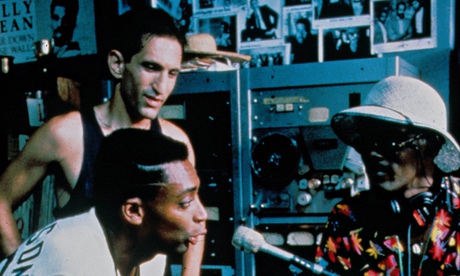
Spike Lee's Brooklyn-set comedy-drama Do The Right Thing – which turned 25 this summer – was the first film to grab me by the lapels, slap me around the chops, and really alert me to the shattering power of cinema. I was 13 when I went over my unsuspecting mother's head, and asked my kindly grandad to procure for me the 18-rated VHS from Our Price (RIP) on Streatham High Road. He acquiesced, and in some ways, I wish he hadn't.
The way the film's easy comedic vibe – its seductive melange of music and colour – was so cruelly ruptured by the savage police murder of Radio Raheem (Bill Nunn), the ensuing riot, and those sharply contrasting quotes by Martin Luther King and Malcolm X (one decrying the use of violence; the other advocating it) … well, it was all too much for my tiny mind. I was left stunned, and not a little tearful. Its conclusion remains galling today. As the recent NYPD killing – by chokehold – of an unarmed black man in Staten Island illustrates, Lee's film is both prescient and horribly relevant.
Though Do The Right Thing packs a wallop, it is not an overly heavy film. At its centre is DJ Mister Señor Love Daddy (played by Samuel L Jackson, then a non-ubiquitous presence, on the cusp of fame). Love Daddy is an irrepressible extrovert ensconced within his personalised, glass-panelled panopticon of 80s R&B fun: low-budget radio station 108 We-Love Radio. Following the thrilling opening credit sequence featuring Rosie Perez dancing to Public Enemy's juddering anthem Fight The Power, Love Daddy is the first character Lee introduces to us. We see his mouth in huge close-up and, accompanied by a ringing alarm clock, he tells his community to "Wake up!" Guess what? Everyone listens. I listened, too: I named my (now basically defunct) film blog after his funniest line, about processed hair melting in the summer sizzle: "It's a Jheri-curl alert. If you have a Jheri curl, stay in the house or you'll end up with a permanent plastic helmet on your head fuh-eva!"
In an ingenious touch by costume designer Ruth E Carter, the gaudily-attired Love Daddy, playing on the well-known idiom, quite literally wears a succession of different hats during the film – they're spread out across his console. They subtly connote the variety of community roles he performs: truth-teller, peacemaker (it's he who scoots toward the camera and emphatically calls a halt to the Brechtian, racist name-calling montage midway through), and love-enabler. "We're slowing it down for all the lovers in the house," he purrs. "I'll be giving you all the help you need. Musically, that is." The soul ballads he spins are cheesier than Sal's pizzas, but as the tender, imaginative love scene between Mookie (Lee) and Tina (Perez) illustrates, it does the trick.
Love Daddy steals scenes from other characters – check out the way he dramatically rubs his stomach and points to his mouth in the background while waiting for his lunch from the perma-tardy pizza deliveryman Mookie. My favourite moment in the whole film is his respectful, unexpected and wholly beautiful roll call to legions of black musicians, from Kool Moe Dee to Sade; Bobby McFerrin to Sarah Vaughan.
Here's another thing: Love Daddy might be a pacifist, but he's not apolitical. Listen closely to his closing broadcast, as Lee's camera drifts sadly over the debris from the prior night's ructions, and you'll hear him imploring his local constituents to get out and vote for real-life mayoral candidate David Dinkins. In a pleasing continuum between fictional art and real life, Dinkins was indeed sworn in as the first black mayor of New York City on 1 January 1990, six months after the film's release.
But why do I wish I could be Mr Señor Love Daddy? The answer's quite simple: he's got the best damn seat in the house. Just imagine being in the centre of that sun-drenched Brooklyn block, with all those beautiful brownstones, irrepressible, entertaining characters, and an inexhaustible collection of classic vinyl at your disposal. I've long fantasised about lounging in his booth, cueing up some Keith Sweat, and peering out into the magical, troubling, endlessly compelling world of the greatest film of the 1980s. That – as this article was always bound to conclude – is the triple truth, Ruth.
• Why I'd like to be … John Cusack in Grosse Pointe Blank
• Why I'd like to be … Dan Aykroyd in The Blues Brothers
• Why I'd like to be … Scarlett Johansson in Lost in Translation

